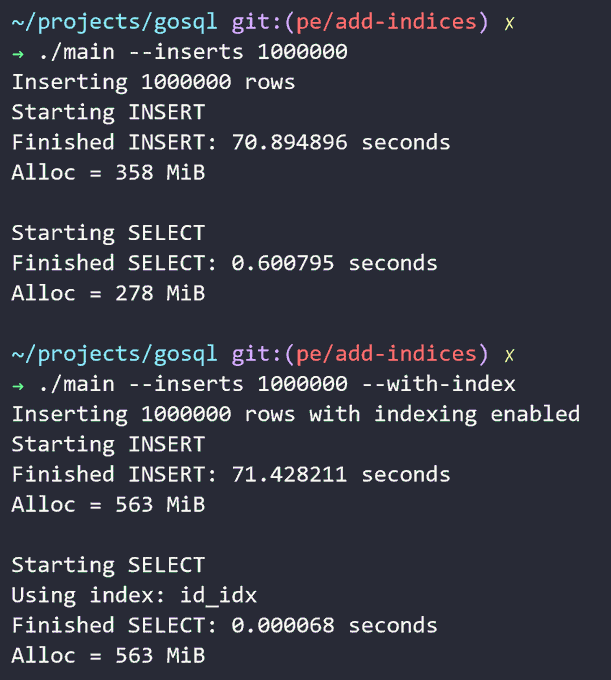gosql
An early PostgreSQL implementation in Go.
Example
$ git clone [email protected]:eatonphil/gosql
$ cd gosql
$ go run cmd/main.go
Welcome to gosql.
# CREATE TABLE users (id INT PRIMARY KEY, name TEXT, age INT);
ok
# \d users
Table "users"
Column | Type | Nullable
---------+---------+-----------
id | integer | not null
name | text |
age | integer |
Indexes:
"users_pkey" PRIMARY KEY, rbtree ("id")
# INSERT INTO users VALUES (1, 'Corey', 34);
ok
# INSERT INTO users VALUES (1, 'Max', 29);
Error inserting values: Duplicate key value violates unique constraint
# INSERT INTO users VALUES (2, 'Max', 29);
ok
# SELECT * FROM users WHERE id = 2;
id | name | age
-----+------+------
2 | Max | 29
(1 result)
ok
# SELECT id, name, age + 3 FROM users WHERE id = 2 OR id = 1;
id | name | ?column?
-----+-------+-----------
1 | Corey | 37
2 | Max | 32
(2 results)
ok
Using the database/sql driver
See cmd/sqlexample/main.go:
package main
import (
"database/sql"
"fmt"
_ "github.com/eatonphil/gosql"
)
func main() {
db, err := sql.Open("postgres", "")
if err != nil {
panic(err)
}
defer db.Close()
_, err = db.Query("CREATE TABLE users (name TEXT, age INT);")
if err != nil {
panic(err)
}
_, err = db.Query("INSERT INTO users VALUES ('Terry', 45);")
if err != nil {
panic(err)
}
_, err = db.Query("INSERT INTO users VALUES ('Anette', 57);")
if err != nil {
panic(err)
}
rows, err := db.Query("SELECT name, age FROM users;")
if err != nil {
panic(err)
}
var name string
var age uint64
defer rows.Close()
for rows.Next() {
err := rows.Scan(&name, &age)
if err != nil {
panic(err)
}
fmt.Printf("Name: %s, Age: %d\n", name, age)
}
if err = rows.Err(); err != nil {
panic(err)
}
}
Parameterization is not currently supported.
Architecture
- cmd/main.go
- Contains the REPL and high-level interface to the project
- Dataflow is: user input -> lexer -> parser -> in-memory backend
- lexer.go
- Handles breaking user input into tokens for the parser
- parser.go
- Matches a list of tokens into an AST or fails if the user input is not a valid program
- memory.go
- An example, in-memory backend supporting the Backend interface (defined in backend.go)
Contributing
- Add a new operator (such as
-,*, etc.) - Add a new data type (such as `VARCHAR(n)``)
In each case, you'll probably have to add support in the lexer, parser, and in-memory backend. I recommend going in that order.
In all cases, make sure the code is formatted (make fmt), linted (make lint) and passes tests (make test). New code should have tests.
Blog series
Further reading
Here are some similar projects written in Go.
- go-mysql-server
- This is a MySQL frontend (with an in-memory backend for testing only).
- ramsql
- This is a WIP PostgreSQL-compatible in-memory database.
- CockroachDB
- This is a production-ready PostgreSQL-compatible database.



